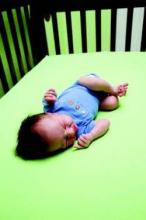Many doctors have neglected to advise or have misinformed mothers on the proper infant care practices, according to a self-report study of mothers, with an oversampling of black and Hispanics.
“Advice received by mothers from potentially influential sources such as medical professionals, family, and the media represents a potentially important modifiable factor that may influence mothers’ choices about infant care practices,” wrote Dr. Staci R. Eisenberg of Boston Medical Center and her colleagues (Pediatrics 2015 [doi:10.1542/peds.2015-0551]). However, little is known about how regularly these mothers receive such advice and whether the advice given is consistent.
The researchers studied responses to survey questions on mothers’ knowledge of generally accepted practices regarding immunization, breastfeeding, sleep position, sleep location, and pacifier use. The survey probed mothers on what advice they received on caring for their infants and from whom they obtained such suggestions. Thirty-two U.S. hospitals administered the survey to approximately 1,000 mothers of infants aged 2-6 months.
Although survey participants most often reported receiving advice on infant care from doctors, approximately 20% of mothers said that they did not receive advice from doctors on breastfeeding and sleep positions, and more than 50% of survey participants said they received no advice about sleep location or pacifier use.
Incorrect advice on breastfeeding and pacifier use was received by 10%-15% of the mothers.
Additionally, more than 25% of the study’s participants were told to have their babies sleep in positions and locations that were “not consistent with recommendations,” a finding that Dr. Scott Krugman of MedStar Franklin Square Medical Center, Baltimore, and Carolyn J. Crumpsty-Fowler, Ph.D., of the Bloomberg School of Public Health, in Baltimore, said they found concerning in an accompanying editorial (Pediatrics 2015 [doi:10.1542/peds.2015-1826]).
This study “is a wake-up call for all pediatricians,” said Dr. Krugman and Dr. Crumpsty-Fowler. “We can and must do a better job of engaging fully in evidence-informed, culturally appropriate public discourse that transforms social norms about the necessity of providing a safe sleep environment for infants.
The survey participants also said they received advice on infant care practices from birth hospital nurses, family members, and the media. Nurses and doctors provided similar advice on most practices. The mothers report receiving advice from family members about 30%-60% of the time on the subjects surveyed, and “more than 20% of advice about breastfeeding, and roughly two-thirds of advice about sleep position, sleep location, and pacifier use was not consistent with recommendations,” the investigators said.
The media was reported as a source of advice less than half of the time on all practices, with the exception of breastfeeding; approximately 70% of mothers reported receiving advice on breastfeeding from this source, but the advice was inconsistent with “recommended infant care practices” about 20% of the time.
Another of the study’s findings was that black and Hispanic mothers were more likely than white mothers to report receiving advice consistent with generally accepted practices.
“For health care providers, our findings may suggest a need for increased attention not only to the content of advice delivered, but also to message clarity and delivery,” noted Dr. Staci R. Eisenberg and her colleagues. Understanding that advice provided often is “inconsistent with recommendations may help identify important targets for public health efforts to increase adherence.”
Read the full study in Pediatrics (doi:10.1542/peds.2015-0551).


